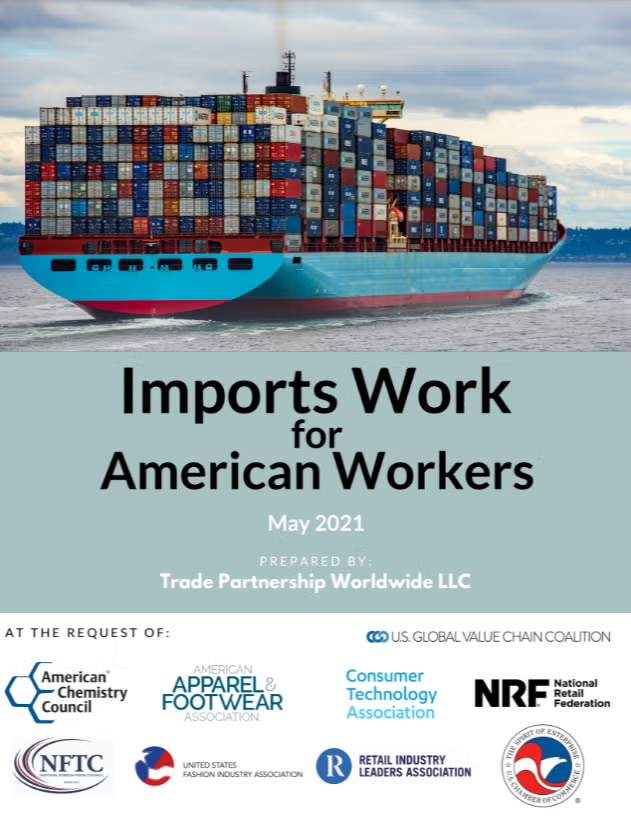
When we think of U.S. jobs supported by overseas trade, our minds may naturally gravitate toward jobs that are made possible by exports. Selling more U.S.-made goods overseas is indeed a proven job-creator – and that’s true of the domestic chemicals industry as well – but it’s important not to overlook the role that imports also play in fueling job creation in the United States.
A new study by the Trade Partnership Worldwide, published in recognition of World Trade Week, has reaffirmed that point, finding that imports support an impressive 21 million American jobs. And, according to the study, two of every three net import-related jobs pay middle class wages. Eight million import-related jobs are held by minorities. Imports also provide employment to 2.5 million workers represented by unions. Most of these jobs belong to small- to medium-sized employers, the lifeblood of the U.S. economy.
The number of U.S. jobs dependent on imports is a significant revelation, as it comes at a time when discussions regarding supply chains, reshoring, and protecting American interests have become focused on reducing U.S. imports, including from trading partners like China. (The U.S-China economic relationship, it turns out, may be far more complex than most proponents of a “decoupling” with China initially thought.)
The Trade Partnership study will likewise resonate with proponents of the Miscellaneous Tariff Bill (MTB), which also recognizes the value of thousands of imports into the United States by temporarily reducing or suspending import duties on those products.
The most recent MTB expired on December 31, 2020. However, at the urging of multiple business groups, including ACC, Senate Finance Committee Chairman Ron Wyden (D-OR) this week introduced new legislation, “The Trade Preferences and American Manufacturing Competitiveness Act,” which would reauthorize the MTB through 2023, plus provide four months of retroactive tariff relief.
ACC is currently reviewing the legislation to ensure it will provide tariff relief on select intermediate inputs recommended for inclusion by the U.S International Trade Commission.
Imports and the U.S. business of chemistry
With a trade surplus of $35 billion in 2019 and $29 billion in 2020, U.S. chemicals manufacturers are widely known as one of our country’s top exporting industries, accounting for approximately 10 percent of all U.S. goods exports. Not to be overlooked, though, is the critical role that imports play to the success of our industry, as well as the success of downstream industries that rely on chemistry to succeed in their businesses.
It may come as a surprise that a significant portion of U.S. chemicals imports – more than half – are intra-company. When U.S. chemicals manufacturers import an intermediate input from an overseas country, the company is frequently executing a trade with its overseas counterpart or subsidiary.
So, although we may produce a lot of chemistry in the United States, not everything is manufactured here at home. We also need to import select intermediate inputs for which there is zero or insufficient domestic supply in the United States.
Our industry then uses those inputs to strengthen U.S. manufacturing processes and ultimately supply the broader manufacturing sector with essential building block materials and specialty chemicals used to develop new, high-performing innovations and to improve the safety and performance of existing products. (And that includes developing and deploying products that can help fight the spread of COVID-19 and save lives – and providing solutions to help society combat climate change.)
MTB reauthorization is urgently needed
The U.S. chemicals industry has witnessed firsthand over the past four years how trade policy uncertainty and the levying of high and broad tariffs on our imports and exports have disrupted the chemical value chain and the industries that rely on the business of chemistry.
As a recent report from Moody’s Investor Services shows, U.S. businesses and consumers are the ones carrying the burden of additional tariffs, absorbing over 90 percent of the cost of the tariffs on imports from China.
To help resolve this issue, ACC has committed to be a leading contributor to President Biden’s 100-day review of the strengths and weaknesses of supply chains across several key industries, filing comments so far on semiconductors, batteries, and critical minerals.
All of this makes the renewed conversation around MTB re-authorization, now led by Sen. Wyden, very timely. The MTB’s expiration at the end of last year means that manufacturers and other businesses are currently paying more than $1.3 million per day in out-of-date, distortive and anticompetitive import tariffs on products not made or available in the United States.
Several U.S. chemicals manufacturers have relied on MTB duty reductions to make the same chemistries at reduced cost. Companies can then use those cost savings to maintain their competitive advantage, create new American jobs, reinvest in innovation and R&D, and export U.S.-made chemicals to foreign markets.
Suspending tariffs on imports of intermediate inputs would reduce costs for U.S. manufacturers, provide an immediate boost to U.S. manufacturing competitiveness, and create a ripple effect of cost-savings – and new jobs – among downstream customers of chemistry.
And, as the Trade Partnership study clearly demonstrates, jobs that depend on imports are good jobs – and they should be protected.


